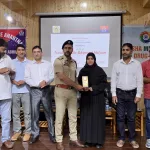As thousands of devotees are undertaking the holy journey of the Amarnath pilgrimage these days, the enhanced and remarkable arrangements put in place by the administration has not only ensured a memorable journey for the pilgrims but set an exemplary display of commitment and hard work towards a hassle free Yatra.
With the Amarnath Yatra attracting a record number of devotees this year , maintaining cleanliness and sanitation at the base camps has been a daunting challenge. However, the sanitation workers working round the clock, along with volunteers, have demonstrated unparalleled dedication to their responsibilities. They work tirelessly, leaving no stone unturned to create a clean and organized environment for the pilgrims.
Since the commencement of the Amarnath pilgrimage, the sanitation workers have been working tirelessly to ensure the well being of the yatris by maintaining a tidy and hygienic environment at the Nunwan Base Camp in Pahalgam, and at other base camps.
These sanitation workers are the unsung heroes who perform their duties round the clock, maintaining the highest standards of cleanliness amidst the large influx of pilgrims.
The Nunwan Base Camp holds immense significance as it serves as the starting point of the Amarnath Yatra. Here, pilgrims gather, prepare themselves mentally and physically, before embarking on the challenging trek to the sacred Amarnath Cave, situated at an altitude of approximately 3,888 meters.
Reyaz Ahmad Shah, the Assistant Commissioner Development (ACD) Anantnag, acknowledges the magnitude of the task at hand. He said, “The camp witnesses around 6,000 to 9,000 pilgrims daily. Despite this rush, we have put in place the highest standards of cleanliness at the Nunwan Base Camp. Be it toilets, sanitation, Langar (community kitchen), roads, or any other spot, we ensure everything remains clean. We have employed an optimum number of workers to accomplish this crucial job.”
To ensure the smooth functioning of sanitation services, the authorities have implemented cleanliness drives in three shifts. Additionally, a solid waste management company has been engaged to handle the waste generated during the Yatra. They follow a comprehensive waste segregation process, ensuring that recyclable and non-recyclable waste is properly managed. The plastic waste, which poses a significant environmental challenge, is handled with special care to minimize its impact. As a result, the Nunwan Base Camp has achieved zero landfill status, a remarkable achievement given the scale of the pilgrimage.
An official said that the camps on both the axis – Baltal and Nunwan host an impressive number of toilet complexes, urinals, and bathing points to cater to the needs of the pilgrims. A total of 5,871 toilet complexes, along with 194 urinals and 500 bathing points, have been erected on both the Yatra axis and Yatri camps. The sanitation workers diligently maintain and clean these public utilities regularly, ensuring their functionality and hygiene.
For tourists and locals visiting the world-famous destination – Pahalgam, the ACD conveys a vital message, “This resort is God’s blessing, and besides the Yatra, it adds to the beauty of Pahalgam. So, we all need to ensure and keep the resort neat and clean.” This call to preserve the natural beauty of the area resonates with everyone, urging them to minimize the use of plastic and generate less waste, thereby aiding the government’s efforts in maintaining the fragile ecological balance at Pahalgam.
Apart from the efforts of the local administration and authorities, various organizations play an instrumental role in ensuring sanitation at the Base Camp on Pahalgam axis. Shri Amarnath Ji Shrine Board (SASB) has set up 1,232 toilets and 289 bath facilities at the camp. To further support sanitation initiatives, the Rural Development Department (RDD) has hired Bhutani International Pvt Ltd, and they have installed 1,315 mobile toilets, with 130 of them converted into bathrooms. Besides, around 1000 sanitation workers which include around 100 sanitation supervisors are managing and ensuring the proper hygiene of the Yatries on Pahalgam axis.
Swaaha Resources Management is responsible for solid waste management, employing a two-bin waste segregation system for solid and kitchen waste. Plastic waste undergoes baling to reduce its volume, while kitchen waste is shredded and then composted.
The efforts of these sanitation workers have received appreciation from devotees and tourists alike. Yana, a Ukrainian religious tourist, praises the sanitation work carried out at Nunwan, Chandanwari camps, and along the trek route to the Holy cave. She expresses her satisfaction with the cleanliness and top-quality facilities provided, making her journey smooth and pleasant. The spotless toilets and well-maintained facilities left a positive impact on her pilgrimage experience.
The dedication and hard work of sanitation workers at the Nunwan Base Camp play an instrumental role in ensuring a smooth and safe pilgrimage for devotees. Their commitment to maintaining cleanliness and hygiene contributes to the spiritual journey of the pilgrims, allowing them to focus on their devotion and connect with the divine during the Amarnath Yatra. These unsung heroes, working tirelessly behind the scenes, make a significant difference in upholding the sanctity of the pilgrimage and preserving the pristine beauty of the surroundings in Pahalgam and Baltal. Their efforts serve as a testament to the spirit of service and selflessness that define the essence of the Amarnath Yatra.





